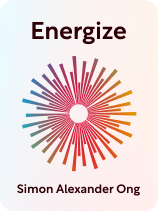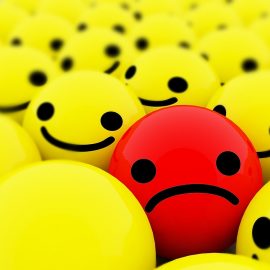

This article is an excerpt from the Shortform book guide to "Energize" by Simon Alexander Ong. Shortform has the world's best summaries and analyses of books you should be reading.
Like this article? Sign up for a free trial here.
What’s Energize by Simon Alexander Ong about? What are the benefits of harnessing your energy?
Our personal energy is a force that affects every aspect of our lives. It’s also infectious, influencing other people’s moods and behaviors. In Energize, Simon Alexander Ong suggests that harnessing your energy is the key to achieving your most ambitious goals.
Read below for a brief overview of Energize.
Overview of Energize by Simon Alexander Ong
Call it what you will—motivation, drive, charisma, magnetism—personal energy is a universal force that affects every aspect of our lives, and we’re aware of it either by its presence or its absence. A person’s energy is infectious, influencing other people’s moods and behaviors. For instance, you may know someone who always brings the party to life or is able to shift a team into high gear. Conversely, there are those who suck the energy out of a room or have a knack for grinding progress to a halt. Given the choice, wouldn’t you prefer to be one of the former instead of the latter?
In Energize, Simon Alexander Ong suggests that harnessing your energy is the key to self-improvement and achieving your most ambitious goals. Your energy levels affect your ability to perform at your best, make good decisions, and achieve what you want in life. It almost goes without saying that the more challenging your objectives, the more energy you’ll need to accomplish them. The good news is that optimizing your personal energy is something that Ong says anyone can learn. With dedicated effort and self-awareness, you can boost your energy and that of those around you, improving your relationships, enhancing your overall impact on the world, and living a happier, more meaningful life.
Ong is a life coach and entrepreneur known for his work on personal energy and success. With a background in finance and public speaking, he has established himself as an expert in helping individuals and organizations maximize their potential. In 2019, Ong was recognized as Life Coach of the Year by the International Coaching Federation. In addition to regular high-profile speaking engagements and podcast appearances, Ong publishes a newsletter where he shares motivational content and practical advice.
Cultivate Your Energy
How much energy you have depends on both your body and your mind, and how you care for them. In the first half of this guide, we’ll discuss Ong’s advice for how to raise and maintain your personal energy by treating your body well, feeding your mind, and letting your energy levels recharge—all of which can help you tap reserves of inner power you may not have known were even there.
Nourish Your Body
It should come as no surprise that how much energy you have depends greatly on your physical health. Neglecting your health can lead to burnout and exhaustion, which can stop you from finding your direction in life. While you can’t control everything that happens in your body, Ong identifies three cornerstone habits to focus on if you want to optimize your energy—exercise, diet, and sleep.
Ong explains that exercise triggers a reaction in your body that releases mood-lifting hormones that increase your overall energy. However, exercise won’t lift your spirits if it’s something that you dread. Therefore, it’s important to discover forms of exercise that you actually like. Some people prefer hiking in nature or walking through parks instead of going to the gym. You may find that you enjoy cycling or yoga as part of your exercise plan. Ong suggests that you give yourself a variety of exercise options to choose from so that you don’t feel stuck in a routine, and that you make some form of exercise a can’t-skip part of your daily regimen.
Diet plays an equally significant role in raising your body’s available energy. It’s a simple equation—food equals fuel, but you need to make sure you have the right fuel in your tank. Ong doesn’t point to any modern diet fads, but simply emphasizes the importance of staying hydrated, eating balanced meals, and incorporating energy-boosting, nutrient-rich fruits and vegetables into your diet in place of valueless, over-processed snacks. When it comes to what we eat, temptations abound, so if you want to make healthy choices, Ong recommends planning your meals ahead so you can strategically ensure you have foods available that support your energy.
Nourish Your Mind
As important as it is to take care of your physical needs, you can’t focus and direct your energy without also taking care of your mental and emotional well-being. Most of the qualities we think of as “high-energy”—such as leadership, enthusiasm, and determination—are mental states that can only thrive if you nurture a healthy mindset. Ong highlights continual learning and inner reflection as tools that benefit your mind the way that exercise, good food, and sleep do for your body.
Making lifelong learning a habit will open your mind to new perspectives that serve as a wellspring for mental energy. Chief among these is curiosity, the underlying basis for original thinking, innovation, and creativity. The trick is learning how to stay curious in situations where you think you’re an expert. Ong suggests that you approach every situation as if you’re a novice, even when you’re not. Asking questions can lead to surprising answers you’d never have considered from your own point of view. Unexpected answers point to creative solutions, but the unexpected also breeds excitement. Therefore, being curious about what you already “know” brings your mind a sense of energy you wouldn’t have otherwise tapped.
If you’re going to ask questions, you must also learn to listen. Ong writes that being a good listener lets you learn from others while also building and energizing relationships. Effective listening makes others feel valued, so especially if you’re in a leadership role, you can use your questions to let others on your team open up about their ideas. This serves a dual purpose—it feeds your curiosity while letting those around you feel energized and empowered. Don’t worry that asking questions will make you seem weak or tarnish your image—Ong argues that the opposite is true, and many of today’s top leaders are marked by their openness to new ideas from any source available to them.
Replenish Your Reserves
Before you start to get the impression that you should be energetic all of the time, Ong says that’s far from the truth. Instead, you should think of your energy as a valuable resource that must be carefully managed. You do this by giving yourself time to relax, avoiding doing things that will pointlessly drain you, and cultivating relationships that give you energy instead of taking it away.
First, Ong writes that it’s important to know how your energy fluctuates throughout the day. You may already be aware of your patterns, but you should still track your day’s highs and lows so you can schedule your most important tasks for when your energy peaks. You should also schedule breaks, since daily life will often find ways to distract you from relaxing. Ong is in favor of using your breaks to clear your mind instead of seeking further distractions like the internet. It’s when your mind is at its most quiet that your best ideas can bubble to the surface. Quiet time also lets your energy recover—whether you’re strolling through a park or meditating in your office. Like sleep at night, breaks during the day are vital to staving off energy exhaustion.
Ong says that as important as it is to know your energy cycles, you also need to determine what takes energy away from you and set up barriers against it. In today’s world, your energy is constantly under attack by distractions such as emails, phone calls, meetings, to-do lists, and a barrage of social expectations. All these things can siphon energy from you at times when you need it most, so you may have to set up deliberate walls—turning off your phone, closing your office, and scheduling time for uninterrupted focus. The hardest part may be learning to turn down requests from friends, family, and colleagues that will take you away from pursuing your goals. You can set boundaries gracefully, but nevertheless, they should be firm.
Direct Your Energy
So far, we’ve discussed where your energy comes from, how you can increase it, and how you can manage it. Now we’ll explore how you can use it to chase your dreams and live a more satisfying life. Ong writes that you begin by vividly picturing the life you’d like to have and then change the obstacles in your way into stepping stones. In doing so, you can also energize people around you, helping others live better lives through the examples you set and the connections you make on your path to achieving your goals.
Envision Your Future
The first step on your path to success is to define for yourself what success will look like. Without a clear goal in mind to guide you, your energy will be directionless, no matter how well you cultivate it. Ong discusses the importance of clarifying your goal, how to turn your dreams into an actionable plan, and how to frame your feelings toward wealth if that is part of what you’re trying to achieve.
Ong argues that having a specific, long-term vision lets you focus your energy, overcome obstacles, and attract opportunities. He cites many examples from the field of sports, where imagining your goal before achieving it is a standard practice for winning athletes. People who regularly use this practice show that mental imagery can enhance your performance and create a sense that achieving seemingly impossible feats can be done. One way to create such a vision for yourself is to imagine meeting an old acquaintance at some date several years in the future and describing to them everything you’ve achieved in the intervening time.
Though important, having a dream for your future won’t get you far without a plan. Ong relates how a survey of college graduates revealed that thinking through your goals and writing down how you’ll achieve them has a huge impact on long-term success. Therefore, to make your dreams achievable, set aside regular time for self-reflection and strategic planning. If the steps toward your goals aren’t clear at first, Ong offers a variation on brainstorming to guide you—but instead of trying to come up with solutions, think up as many questions as you can, such as “What are your talents? What are your obstacles? What strengths can you develop? Who can help you?” Answering these questions will help you chart your course of action.
A Word on Wealth
It may be that part of your vision for the future involves being rich, or at least well-off financially. Ong says that’s perfectly normal, but you need to understand that money can bring energy to your life, or it can take it away. For sure, a degree of financial security can give you peace of mind, but having money doesn’t necessarily free you from the perils of managing it. Ong illustrates this with studies of lottery winners who, since they have no purpose for their money, spend every penny and end up worse off than before. That’s why you need to have a financial plan—so that money can act as a tool to reach your goals and lets you direct your energy purposefully instead of distracting you from your true ambitions.
Ong argues that beyond developing good financial habits, you must have a clear purpose for the money you make. Therefore, as part of your plan for the future, you need to determine why you want to make money. If you do, then earning wealth will bring energy to your process and give a concrete direction to your financial decisions. However, if you harbor negative views about “getting rich” while simultaneously trying to better your finances, this mental misalignment of your energy toward money can lead you to subconsciously sabotage your progress. If financial freedom is necessary for your ambitions, then you need to make peace with the concept of wealth and accept “living the good life” as part of your plan.
Adopt a Positive-Energy Mindset
While you’re envisioning what you want to achieve, you also need to think about what’s standing in your way. Ong suggests that our biggest obstacles are self-inflicted mental blocks that we put in the way of our own energy. To get around these blocks—or remove them entirely—you need to adjust how you think about yourself, learn to see failures as stepping stones to growth, and persist through any challenges and fears that may be slowing your progress.
When it comes to directing your energy, mental barriers are more serious than you think. Ong argues that we behave in accordance with our self-perceptions, and our beliefs create our reality. Therefore, any negative self-beliefs you have will manifest in how the world reacts around you. To counter this, Ong writes that you need to identify and challenge your self-limiting beliefs and replace them with more empowering ones. You can do this step-by-step through journaling to root out and reexamine your beliefs, countering them with positive self-talk to boost how your energy expresses itself. Speaking to yourself with compassion and encouragement will shift your energy and your outlook on what you can achieve.
But do self-affirmations really work? Ong says “absolutely.” By consistently repeating positive statements, you realign your brain toward success and happiness, raising your energetic levels in the process. In addition to adopting positive beliefs about yourself, Ong goes a step further and suggests you adopt the belief that the world itself is working to help you—an attitude that will help you maintain your positive energy and overcome obstacles. Even if such a belief isn’t literally true, a hopeful outlook on life can be a strong placebo, and psychologists have demonstrated the near-miraculous power of the placebo effect to better people’s lives and make the seemingly impossible come true.
However, no matter how hard you wish against it, life will throw hardships and curveballs in your way. Ong suggests that this isn’t a bad thing, because obstacles and challenges can be transformed into sources of energy and growth. If you keep an open, positive mindset, you’ll recognize that every problem or failure contains a hidden gem of opportunity that you might turn to your advantage, if only by learning to overcome it. What’s important is to focus on what you can control, which is largely your own response to events. If you respond in a way that’s self-empowering, then what greater boost could your energy receive than the knowledge that you faced adversity and beat it?
Persistence and Action
Ong reiterates that you’ll inevitably run into challenges on your way toward success. Optimizing your energy can help you persist through hardships and adapt to meet your struggles. Doing so doesn’t just help you reach your goals, but it also transforms your identity and self-perception. When you’re able to overcome your fears and persist beyond what you thought were your limits, you’re not only building momentum—you’re also learning your true motivations for pursuing your ultimate goals. The struggles you face as you do the daily work to move closer to your dream help to clarify why your ambitions are worth the effort.
What’s important is that you take action toward your goals instead of waiting for the perfect time to begin. Ong insists that even small, consistent steps lead to progress over time. Don’t fall for the common misconception that you have to be an expert before putting your energy into your dream, whether that’s writing a novel, starting a business, or bucking for a promotion. What we rarely realize is that everyone else is learning as they go as much as we are.
When trying something new, you’re bound to be nervous, but Ong says you can use your fear to drive your progress, rather than letting it be a barrier. Maintain your positive-energy mindset, and you’ll be surprised what new chances the world will bring your way.
Energize Those Around You
Ong concludes by returning to the idea that energy doesn’t exist in a vacuum. Just as you’re energized by the people in your life, so too is the world affected by the energy you have to offer. For that reason, Ong says you should deeply consider how your energy can benefit others and in what way the energy you bring to the world will linger into posterity.
Even the small things we do can be significant to those we interact with. For this reason, Ong argues that everyone has the ability to help others, regardless of what’s going on in your life. In the end, your energy is your most valuable possession, and what better use for it could there be than to elevate the world and lives around you? How to do this runs the gamut from being an energizing leader in your workplace or community to simply showing kindness to a person in need. Ong insists that by giving energy to others, you gift yourself with a sense of joy and fulfillment that keeps your positive energy flowing.
Ong asserts that how you direct your energy every day shapes your personal future and the way that others will remember you. To this end, your past doesn’t matter as much as what you’re doing now and where your energy is going. Ong suggests you reflect on how people might think about you when you’re gone. The point of this exercise isn’t to be morbid, but to help you be aware of the distance between who you are at present and who you’d like to be. The energy that you give back to the world is what will let you cross that distance, so let go of the negative beliefs and influences that are holding you back and let your positive energy flow in a way that lets you and those around you feel more alive.

———End of Preview———
Like what you just read? Read the rest of the world's best book summary and analysis of Simon Alexander Ong's "Energize" at Shortform.
Here's what you'll find in our full Energize summary:
- How to cultivate and replenish your energy
- Why your personal energy can be infectious
- How money can give you energy and take it away






